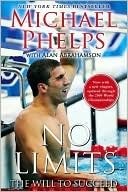More on this book
Kindle Notes & Highlights
I can also visualize the worst race, the worst circumstances. That’s what I do to prepare myself for what might happen. It’s a good thing to visualize the bad stuff. It prepares you. Maybe you dive in and your goggles fill with water. What do you do? How do you respond? What is important right now? You have to have a plan.
If you put a limit on anything, you put a limit on how far you can go.
At ages nine and ten, I was swimming seventy-five minutes per day four times a week, then ninety minutes per day five times a week. At age eleven and twelve, I moved up to swimming every day of the week, each time for two and one-half hours. With all of that, what struck Bob the most about me when we first started together was not anything physical. It was what was in my head.
Are you going to wait until after you win your gold medal to have a good attitude? No. You’re going to do it beforehand. You have to have the right mental attitude, and go from there. You’re going to be an Olympic champion in attitude long before there’s a gold medal around your neck.
This was all about learning to weigh options and make decisions. Mom might have asked leading questions to help me get to the smarter choice. But I had to make the decision myself: Did I love swimming enough to push myself to be the very best I could be?
Fifth. No medal. Malchow won, in 1:55.35. He patted me on the back and said, “The best is ahead of you.” Bob sent me to the pool the next day for a workout. The workout sheet said, “Austin WR.” That meant the 2001 spring nationals in Austin, Texas. No medal at the Olympics? New goal. World record in the 200 fly in Austin.
had been working all year with a nutritionist and had been on a low-sugar, low-protein diet. He kept saying that the rigorous diet was in part to help train his mind;
I don’t look at it as pressure, only as expectations, but the only expectations I focus on are those I have for myself, because those are the only ones I can do something about.
Set your goals high. Work conscientiously, every day, to achieve them.
Nightingale’s work revealed the one thing that’s common to all successful people: They make a habit of doing things that unsuccessful people don’t like to do.
The point of competition is to compete. It’s to take on the biggest challenge. When you compete against the very best, it makes you better; I don’t care if someone is twenty times better, or one-tenth better. I want to race the best. I hate to lose. But I was not afraid to lose. I am never afraid to lose.
Time is a great healer.
You need to set goals and keep in mind that the decisions you make can determine whether you will achieve those goals,
“In order to make good decisions, you really have to see the whole picture,”
Bob had let me learn the hard way that there was no substitute for the hard work it would always take to get better.
Bob also, quite deliberately, would arrange practices, schedules, workouts, drills, whatever he could think of, around the idea of being uncomfortable.
no matter what you set your imagination to, anything can happen if you dream as big as you can dream.


